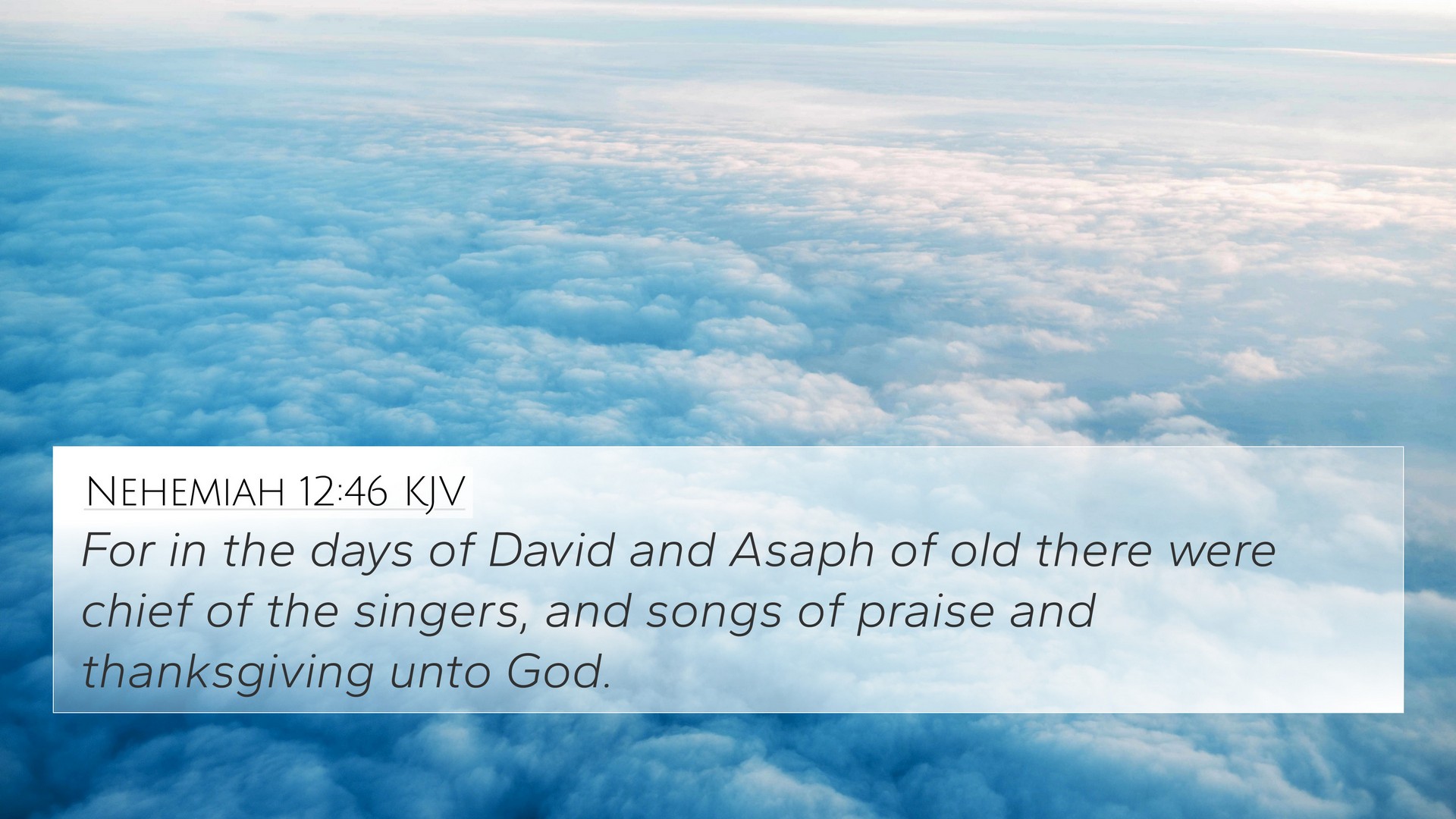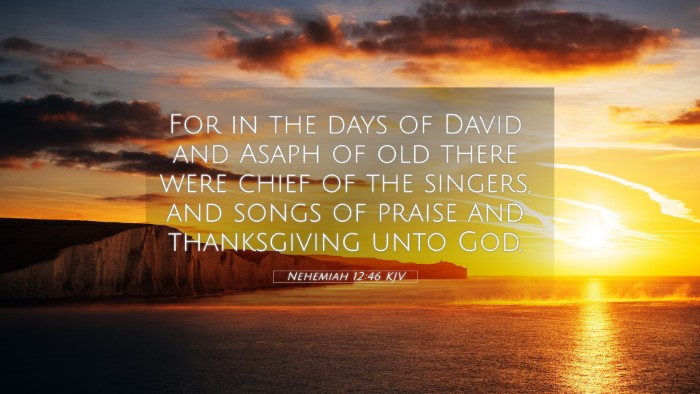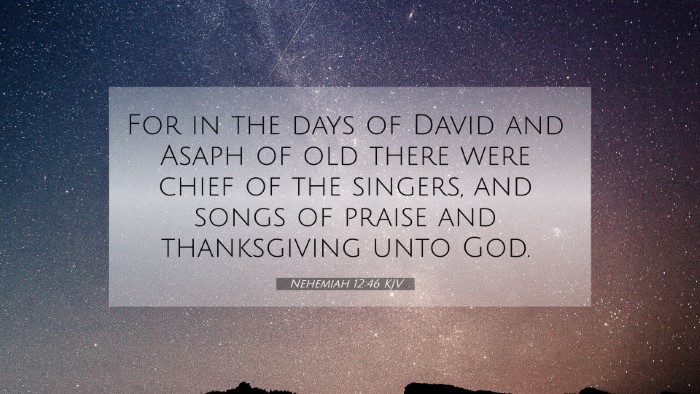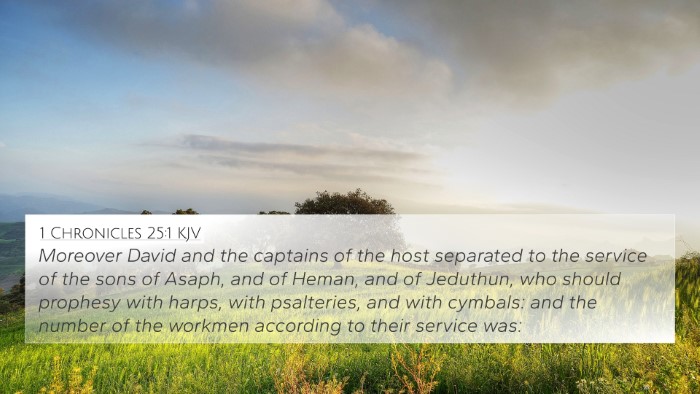Understanding Nehemiah 12:46
Verse Context: Nehemiah 12:46 states, “For in the days of David and Asaph of old there were chief of the singers, and songs of praise and thanksgiving unto God.” This verse serves as a historical reference to the musical traditions established during the leadership of David and Asaph, which are important for the worship practices revived in Nehemiah’s time.
Meaning and Interpretation
This verse highlights two key elements:
- Historical Context: The verse connects the period of Nehemiah with the earlier significant figures in Israelite history, specifically King David and the chief musician Asaph. Their contributions to worship set a precedent for the musical and liturgical practices during Nehemiah's reforms.
- Worship Revival: The mention of singers and songs suggests a revival of worship practices that were crucial for the spiritual renewal of the people returning from exile.
Commentary Insights
Matthew Henry's Commentary
Matthew Henry emphasizes the importance of music in worship as a way to express gratitude and reverence towards God. He points out that worship should include both singing and thanksgiving, which were integral to the assembly of God's people.
Albert Barnes' Notes
Albert Barnes explains that the reference to David and Asaph signifies a restoration of the ancient practices of praise, emphasizing that the leadership of these figures laid the foundation for worship, and Nehemiah sought to reinstate these practices to enhance spiritual life among the returning exiles.
Adam Clarke's Commentary
Adam Clarke contextualizes this verse within the broader narrative of Nehemiah, noting that the establishment of choirs and song leaders was part of the efforts to ensure that worship was celebrated joyfully and in an orderly manner, reflective of God’s greatness.
Bible Verse Cross-References
Several Bible verses relate closely to Nehemiah 12:46, depicting the continuity and significance of worship in Israel:
- 1 Chronicles 15:16: “And David spake to the chief of the Levites to appoint their brethren to be the singers with instruments of music, psalteries, and harps, and cymbals, sounding, by lifting up the voice with joy.”
- Psalm 150:3-6: “Praise Him with the sound of the trumpet; praise Him with the psaltery and harp…”
- 2 Chronicles 5:13: “It came even to pass, as the trumpeters and singers were as one, to make one sound to be heard in praising and thanking the Lord…”
- Psalm 95:1-2: “O come, let us sing unto the Lord: let us make a joyful noise to the rock of our salvation.”
- Ezra 3:10: “And when the builders laid the foundation of the temple of the Lord, they set the priests in their apparel with trumpets, and the Levites, the sons of Asaph, with cymbals…”
- Nehemiah 10:39: “For the children of Israel and the children of Levi shall bring the offering of the corn, of the new wine, and the oil, unto the chambers, where are the vessels of the sanctuary…”
- Ephesians 5:19: “Speaking to yourselves in psalms and hymns and spiritual songs, singing and making melody in your heart to the Lord;”
Connections Between Bible Verses
The connections established between Nehemiah 12:46 and the above cross-referenced verses reflect a recurring theme in Scripture concerning the importance of music and praise in worship. Here are some thematic insights:
- Legacy of Worship: The worship models set by David and Asaph are echoed in the practices reinstated by Nehemiah, underscoring the importance of honoring God through music throughout generations.
- Collective Worship: Verses from both the Old and New Testaments highlight the significance of corporate worship, illustrating that when believers unite in song, they create a powerful expression of faith and gratitude.
- Spiritual Renewal: The revival of worship in Nehemiah’s time parallels the call for spiritual renewal throughout the Bible, showing that worship is vital for maintaining a relationship with God.
- Instruments in Worship: References to various musical instruments across these verses demonstrate the diversity in worship styles and emphasize creativity in honoring God.
Tools for Bible Cross-Referencing
To further explore the connections between Bible verses, several resources can be utilized:
- Bible Concordance: A comprehensive list of verses organized alphabetically or by topic can help identify related scriptures.
- Bible Cross-Reference Guide: These guides provide insights into links between verses across different books of the Bible.
- Cross-Reference Bible Study: A systematic approach to studying the Bible through its interconnections.
Conclusion
Nehemiah 12:46 serves as a key reminder of the significance of worship and the continuity of practices that glorify God. By examining this verse alongside its connections through cross-references, believers can gain a fuller understanding of worship's role throughout biblical history and its application in today’s faith communities.
Through the comparative analysis of these scriptures, individuals are encouraged to engage deeply with the texts, fostering a robust faith founded on the heritage of collective worship and musical expression.






